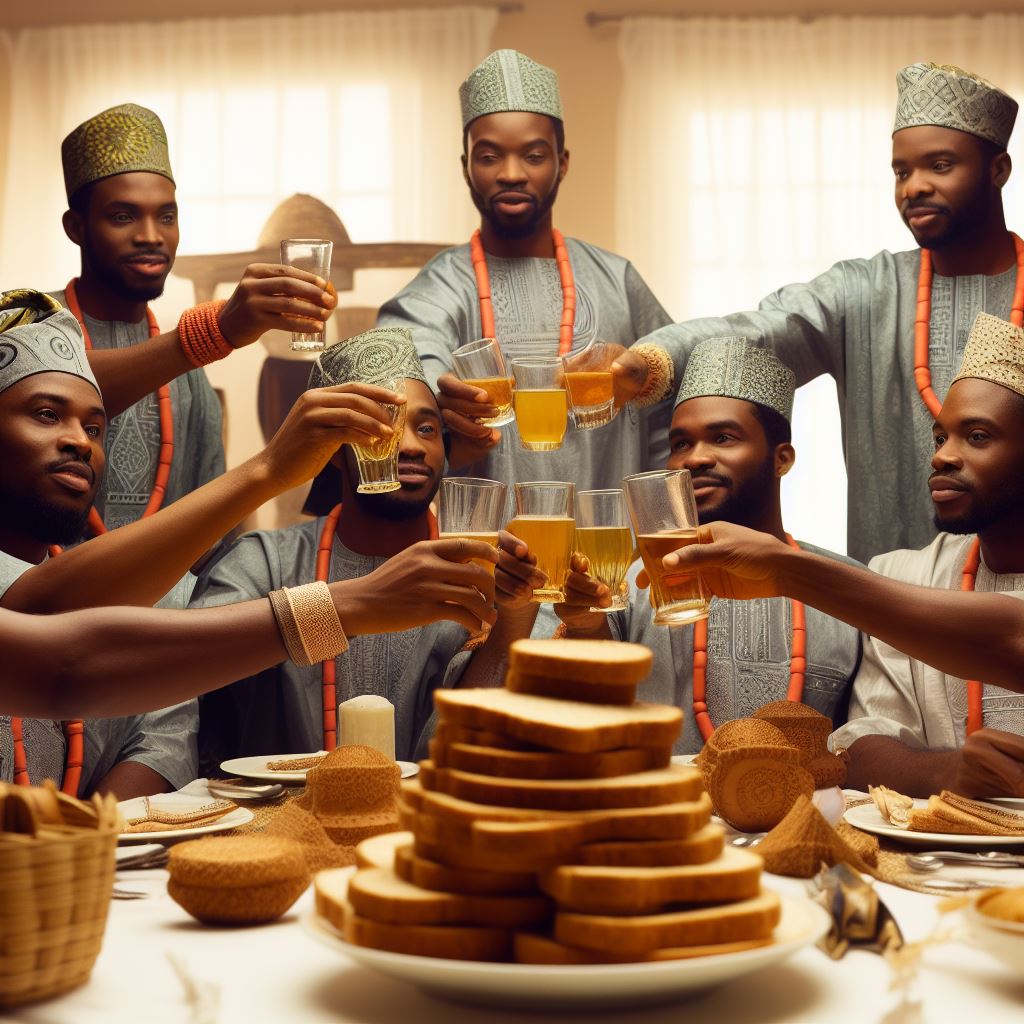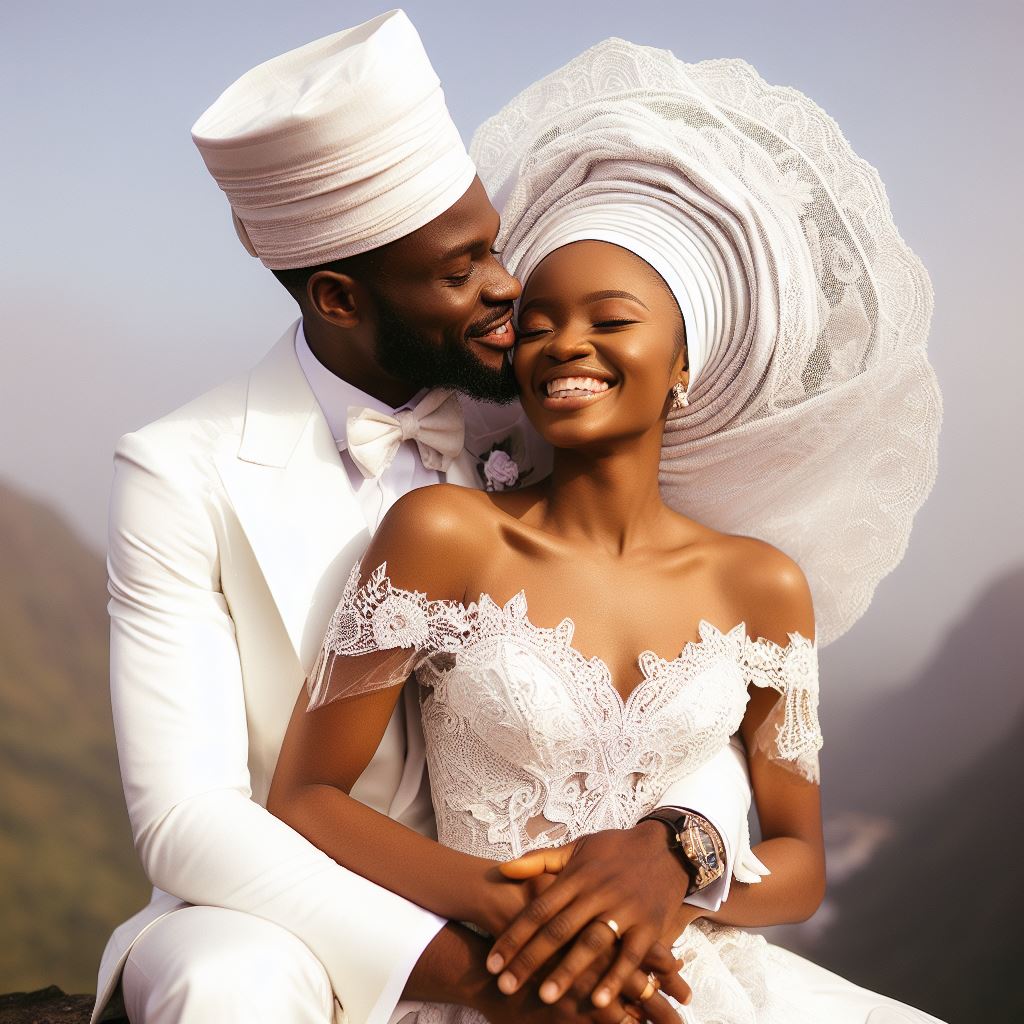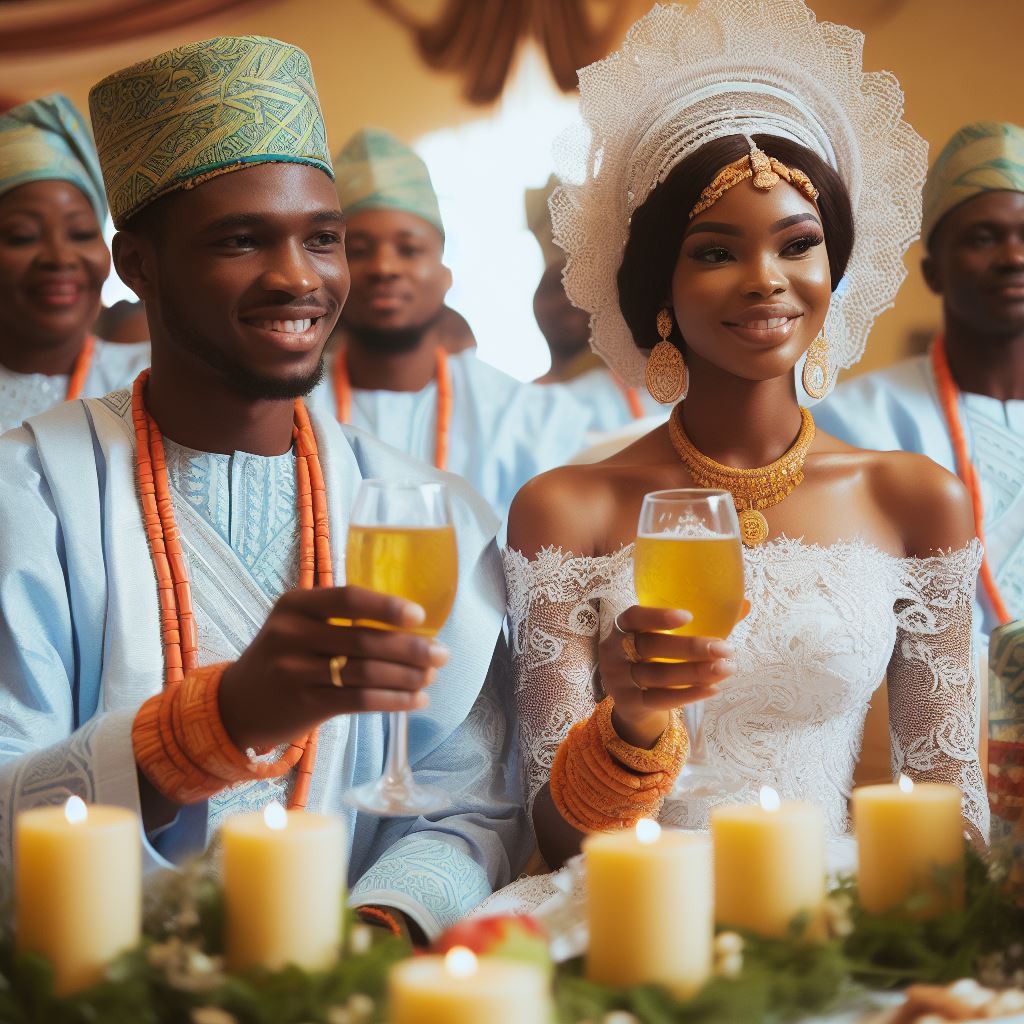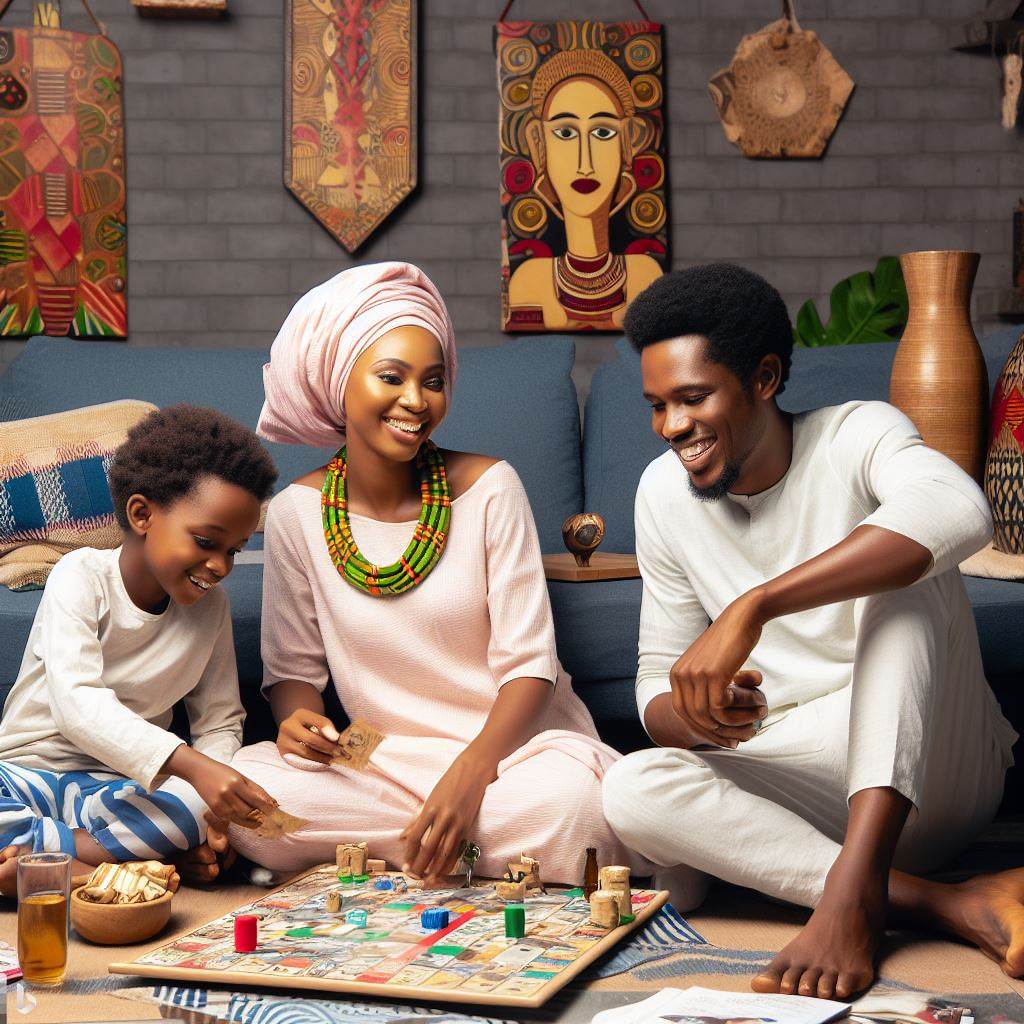Introduction
Hausa culture, rich in traditions, is deeply rooted in Northern Nigeria’s society.
Marriage toasts hold great significance as they bring together cultural values and contemporary practices.
These toasts serve as a platform for expressing love, respect, and blessings for the couple’s union.
Brief explanation of Hausa culture and traditions
Hausa culture thrives in Nigeria and surrounding regions. It features rich customs, vibrant attire, and spirited celebrations.
Their traditional clothing, called “Babban Riga,” comprises colorful flowing robes adorned with intricate embroidery.
Respect for elders is paramount, as the Hausa people value wisdom and experience, seeking guidance from their seniors.
Islamic faith deeply influences their way of life, as many Hausa are devout Muslims, following prayer and fasting rituals.
Hausa cuisine is renowned for dishes like Suya, a skewered meat delicacy, and Masa, a fluffy rice cake.
The vibrant Durbar festival is a captivating spectacle of horsemanship, music, and dance, attracting tourists and locals alike.
Gender roles are distinct, with men often responsible for providing and women for household management and child-rearing.
Traditional music and dance play a vital role in Hausa celebrations, reflecting their history and cultural identity.
Weddings are elaborate affairs, blending Islamic and indigenous customs, with joyful celebrations lasting for days.
In essence, the Hausa culture is a tapestry of tradition, religion, and a strong sense of community.
Importance of marriage toasts in Hausa culture
Marriage toasts in Hausa culture hold profound significance. They celebrate love, unity, and communal bonds, fostering cherished traditions.
These toasts symbolize enduring commitment and embody cultural heritage.
Through eloquent speeches and heartfelt well-wishes, they weave the couple into the fabric of the community.
Guests raise their glasses, offering blessings for a prosperous, harmonious union. The toasts, often in poetic verses, epitomize the beauty of Hausa oral tradition.
They transmit wisdom and values from one generation to the next, strengthening the cultural tapestry.
These toasts, accompanied by traditional music and dance, infuse weddings with joy and exuberance.
They cement the couple’s place in the collective memory, their love story forever etched in the hearts of those present.
In Hausa culture, marriage toasts are more than a simple gesture; they are a celebration of love, family, and culture.
These toasts bring people together, bridging the past with the future, and reaffirming the importance of marriage in Hausa society.
Historical background
Hausa marriage toasts have a strong significance in traditional Hausa society, dating back centuries.
These toasts play a crucial role in the marriage process, reflecting the cultural values and traditions of the Hausa people.
The history of Hausa marriage toasts can be traced back to ancient times when marriages were arranged by parents or elders.
These toasts were an essential part of the negotiation process between the families of the bride and groom.
They served as a way to establish trust, respect, and commitment between the two families.
In traditional Hausa society, marriage toasts were recited by poets known as “matsalle” during wedding ceremonies.
These poets were highly esteemed and had the responsibility of composing and delivering praise-filled verses about the bride, groom, and their families.
The toasts often depicted the virtues, beauty, and lineage of the couple.
As time went on, the tradition of Hausa marriage toasts evolved.
With the introduction of Islam in the region, religious elements were incorporated into the toasts.
Islamic teachings, verses from the Quran, and prayers became integral parts of the toasts, symbolizing the spiritual unity and blessings sought for the newlyweds.
Furthermore, the introduction of formal education and exposure to Western ideas had a significant impact on the evolution of marriage toasts in Hausa society.
Younger generations started incorporating modern language, influences, and humor into the toasts, merging traditional and contemporary elements.
Today, Hausa marriage toasts have undergone further changes due to globalization and the influence of technology.
Modern couples often opt for shorter and more concise toasts, accommodating the fast-paced lifestyle.
However, the fundamental essence of the toasts remains intact, emphasizing love, respect, and the unity of families.
Examples of traditional and modern Hausa marriage toasts
Traditional Hausa marriage toasts
- “May the union of this couple bring forth prosperity and blessings to both families.”
- “Let the love shared between the bride and groom be as strong as the Sahara desert, enduring the test of time.”
- “Through this marriage, two souls are united, binding two families in eternal companionship.”
- “May Allah bless this union with abundance, offspring, and a lifetime of happiness.”
Evolved Hausa marriage toasts
- “As their journey begins, may their love be as infinite as the number of stars in the sky.”
- “To the couple who redefine tradition and embrace change, may their love story inspire generations to come.”
- “May their laughter be contagious, their bond unbreakable, and their love unstoppable.”
- “In a world of chaos, this couple stands as a testament to love’s power; may their light continue to shine.”
In essence, Hausa marriage toasts have a deep-rooted historical background and have evolved over time, adapting to societal changes.
These toasts serve as a reflection of Hausa cultural values, while also incorporating modern influences.
Whether traditional or evolved, Hausa marriage toasts are a celebration of love, union, and the coming together of families.
Read: Igbo Wedding Toasts: Blending Tradition & Modernity
The role of marriage toasts in contemporary Hausa society
How marriage toasts are still an integral part of Hausa weddings today
Hausa marriage toasts continue to have a significant role in contemporary weddings.
They are a way for families and friends to celebrate and express their joy for the couple.
Toasts are delivered during wedding ceremonies, usually by respected elders or close friends.
These toasts serve as a means to bless the couple and wish them a prosperous and successful marriage.
The toasts often include prayers for fertility, happiness, and unity in the marriage.
It is customary for guests to respond to toasts by showering the couple with gifts and blessings.
Marriage toasts also provide an opportunity for individuals to showcase their oratory skills and creativity.
They are considered a form of entertainment, adding a vibrant and jovial atmosphere to the wedding.
Through these toasts, the Hausa people maintain their cultural heritage and pass it down to future generations.
The continuation of marriage toasts reinforces the idea that weddings are not solely about the couple but also about the community.
How toasts reflect the values and customs of the Hausa people
Marriage toasts in Hausa society reflect the core values of respect, family, and community.
Respected elders delivering toasts symbolize the importance of elders’ wisdom and guidance.
Toasts often emphasize the significance of the institution of marriage in Hausa culture.
They highlight the responsibilities and expectations placed on married individuals within the community.
Through toasts, the Hausa people stress the importance of unity, loyalty, and cooperation in a marriage.
Toasts also serve as a platform to showcase the rich Hausa language and poetic traditions.
Hausa wedding toasts incorporate proverbs, metaphors, and poetic expressions, adding depth and meaning.
They reflect the customs of giving gifts and showing appreciation during special occasions like weddings.
Importantly, toasts demonstrate the Hausa people’s commitment to preserving their cultural identity.
Marriage toasts reinforce the idea that a wedding is not just a union of two individuals but of two families and communities.
Importance of toasts in establishing social bonds and relationships
Marriage toasts play a crucial role in creating and strengthening social bonds within the Hausa society.
They allow individuals from different families, clans, and communities to come together and celebrate.
Through toasts, new connections and relationships are formed, promoting unity and solidarity.
Individuals delivering toasts become an extended support system for the couple and their families.
Toasts act as a way to express gratitude towards participants and guests, fostering goodwill and reciprocity.
Guests responding to toasts by blessing the couple instills a sense of belonging and communal support.
The celebratory nature of marriage toasts creates an environment for networking and establishing new social connections.
These toasts contribute to the overall positive and inclusive atmosphere during Hausa weddings.
By actively participating in toasting traditions, individuals become part of a collective celebration of love and commitment.
In a nutshell, marriage toasts in contemporary Hausa society hold great importance as they serve as a unifying force for the community.
Read: Infusing Pidgin English into Your Nigerian Wedding Toast
Traditional Hausa marriage toasts
Typical toasts made during Hausa marriage ceremonies
Traditional Hausa marriage toasts are an integral part of the marriage ceremony, serving as a form of celebration and blessing for the couple.
These toasts are filled with symbolism and rich cultural significance.
During Hausa marriage ceremonies, toasts are made to honor and bless the couple as they embark on their journey of marriage.
These toasts are usually given by family members, close friends, or respected elders in the community. Each toast carries a specific message and is meant to evoke emotions of joy, love, and unity.
The content of the toasts often includes prayers for the couple’s happiness, well-being, and prosperity.
They express the hope that the couple’s union will bring blessings and harmony not only to themselves but also to their families and the entire community.
These toasts also highlight the importance of mutual respect, understanding, and cooperation within the marriage.
Content and symbolism behind these toasts
Symbolism plays a significant role in Hausa marriage toasts, with each word carrying deeper meaning.
The toasts often draw inspiration from nature, using metaphors to express the couples’ love and commitment.
For instance, references to rivers symbolize the everlasting flow of love, while mentions of trees signify strength, stability, and endurance.
Hausa marriage toasts frequently emphasize the essential role of family and community in the couple’s life.
They acknowledge the support and guidance of parents, elders, and well-wishers.
These toasts remind the couple of their responsibility to uphold the values and traditions of their ancestors, ensuring the preservation of Hausa culture for future generations.
Examples of traditional Hausa marriage toasts
To illustrate the richness of Hausa marriage toasts, here are a few examples:
- “May your love be as endless as the flowing river, and may you find solace in each other’s arms.”
- “May your union be as strong as the baobab tree, standing firm through life’s storms and providing shade and shelter for all.”
- “As the sun rises and sets, may your love stand the test of time, radiating warmth and light to all who surround you.”
- “Just as the moon and stars illuminate the night sky, may your love shine brightly, lighting up your path in life.”
- “May your marriage be a garden, where love blossoms and blooms, nurturing a beautiful bond that brings joy to all.”
These toasts beautifully capture the essence of Hausa traditions and the profound symbolism behind them.
They serve as a reminder of the importance of love, respect, and unity within the institution of marriage.
In fact, traditional Hausa marriage toasts hold great significance in Hausa culture.
These toasts, filled with symbolic language and heartfelt blessings, set the tone for a joyous and harmonious union.
They celebrate the couple’s love and commitment while acknowledging the importance of family and community.
Hausa marriage toasts are a testament to the rich cultural heritage of the Hausa people and the timeless values they hold dear.
Read: Yoruba Wedding: A Deep Dive into Traditional Toasts

Modern Influences on Hausa Marriage Toasts
In the traditional Hausa culture, marriage toasts hold great significance as they serve as a form of tribute and celebration for the couple and their families.
However, with the advent of modern influences, these toasts have undergone a transformation, incorporating elements that reflect the changing times.
Let’s explore how modern influences have impacted traditional Hausa marriage toasts.
Incorporation of Modern Elements
One of the most notable changes is the inclusion of modern elements, such as music and dance, into the toasting rituals.
In the past, toasts were primarily spoken, with elders composing poetic verses to honor the couple.
Nowadays, music and dance have become integral parts of the toasting ceremony, adding a lively and vibrant atmosphere to the celebrations.
Contemporary Hausa couples are increasingly opting for live music bands or DJs to provide entertainment during their weddings.
These musicians not only play traditional Hausa tunes but also incorporate modern genres like pop, hip-hop, and R&B into their repertoire.
This fusion of traditional and modern music ensures that guests of all generations can join in the revelry and enjoy the festivities.
Dancing has also evolved significantly in Hausa marriage toasts.
While traditional dances like the “Gorogor” and “Bori” still hold importance, couples now introduce contemporary dance styles like salsa, tango, and even breakdancing.
These new additions reflect the couple’s desire to showcase their individuality and create memorable experiences for their guests.
Celebrating with Unique Toasts
Contemporary Hausa couples are finding innovative ways to personalize their wedding toasts.
They seek to break away from the traditional verses and create unique toasts that resonate with their personalities and experiences.
For instance, some couples incorporate spoken word poetry, expressing their love and gratitude through powerful rhythmic verses.
Others might choose to recite personal anecdotes or share humorous stories, engaging the audience and evoking laughter.
Technology has also played a role in modernizing Hausa marriage toasts.
Couples now use audio-visual presentations to share their journey together, displaying photos and videos of their time as a couple.
This multimedia approach helps create a nostalgic and emotional atmosphere, allowing guests to feel more intimately connected to the couple’s love story.
Examples of Contemporary Hausa Toasts
The creativity of contemporary Hausa couples knows no bounds when it comes to toasting. Here are a few examples of how they celebrate their weddings with unique toasts:
- A couple surprises their guests with a flash mob performance, where the entire wedding party bursts into a coordinated dance routine mid-toast.
- During the toasting ceremony, the couple presents a heartfelt song they wrote together, showcasing their musical talents and their love for each other.
- A bride and groom recite a personalized poem they composed for each other, expressing their deepest emotions and promising eternal love.
- A video montage of the couple’s journey is played, featuring interviews with friends and family, highlighting memorable moments and funny anecdotes.
These unique toasts not only entertain the guests but also reflect the couple’s desire to make their wedding a truly memorable and personal experience.
As modern influences continue to shape the world, Hausa marriage toasts have adapted to these changes while still holding on to their traditional roots.
The incorporation of music, dance, and personalized elements has breathed new life into these toasts, making them an integral part of contemporary Hausa weddings.
So, next time you attend a Hausa wedding, be prepared for a toast that combines the old with the new, the traditional with the contemporary—a celebration that truly reflects the unique love story of the couple.
Read: Getting Legal Help: Navigating Marriage Contracts in Nigeria
Challenges and Controversies: Addressing Potential Challenges Faced by Hausa Couples Regarding Marriage Toasts
Marriage toasts within the Hausa culture hold great significance and are an integral part of traditional wedding ceremonies.
However, like any tradition, there are challenges that couples may face when navigating through the toasting rituals.
Language Barriers
The primary challenge for Hausa couples centers around language barriers when conducting marriage toasts.
It is crucial for both the couple and their families to understand the specific words and phrases used in the toasts.
Solutions to overcome this challenge include providing translations or explanations of toasting phrases for those unfamiliar with the Hausa language.
Cultural Expectations and Adjustments
Cultural expectations can create challenges when it comes to marriage toasts.
Hausa society has certain customs and traditions that govern the roles and behavior of both the bride and groom.
Navigating these expectations while incorporating personal preferences can be a delicate balance for couples.
Open communication and mutual understanding between the couple and their families are necessary to address any conflicts or differences.
Controversies Surrounding Gender Roles and Expectations in Traditional Toasting Rituals
The traditional toasting rituals within the Hausa culture often reinforce gender roles and expectations.
Controversies arise when individuals challenge these traditional norms and desire a more egalitarian approach.
Some argue that toasting rituals should evolve to be more inclusive and representative of changing societal norms.
Controversies surrounding gender roles and expectations can lead to discussions on redefining toasting rituals.
Efforts are being made to encourage equal participation and representation during the ceremony.
Efforts to Adapt Marriage Toasts to be More Inclusive and Representative of Changing Societal Norms
Recognizing the need for inclusivity and adaptability, some Hausa couples have chosen to modify traditional toasting rituals.
These modifications involve incorporating elements from other cultures or personalizing the toasts to reflect the couple’s preferences.
It is important to strike a balance between respecting cultural traditions and embracing the changing needs and values of the couple.
Efforts are being made to create a more inclusive space where everyone feels comfortable and represented during the toasting ceremony.
Ultimately, while marriage toasts hold a significant place in Hausa tradition, there are challenges and controversies that need to be addressed to ensure a meaningful and inclusive experience for the couples.
Overcoming language barriers, navigating cultural expectations, and adapting to changing societal norms are vital for the successful celebration of marriage toasts.
Efforts to create a more inclusive and representative environment will lead to a more harmonious blending of tradition and contemporary values within the Hausa culture.
Conclusion
Marriage toasts hold immense importance in Hausa culture, serving as a way to honor the union between two individuals.
These toasts signify the beginning of a new chapter in the lives of the couple, surrounded by their loved ones.
The coexistence of tradition and modernity is evident in Hausa marriage toasts.
While the essence of tradition is maintained, there is also room for adaptation to contemporary times. This allows the younger generation to connect with their roots while embracing the evolving world.
Preserving and celebrating Hausa customs through toasting rituals is key to keeping the rich heritage alive.
These practices bring the community together, bridging generations and ensuring the legacy is cherished and passed on.
The toasts serve as a symbol of unity, love, and respect, reinforcing the strength of Hausa culture.
As the Hausa community continues to navigate the complexities of modern society, the significance of marriage toasts remains paramount.
They serve as a reminder of the importance of cultural heritage, fostering a sense of identity and belonging among individuals and the community as a whole.
Let us raise our glasses in a toast to the traditions that bind us and honor the customs that have shaped our lives.
Cheers to the timeless essence of Hausa marriage toasts!




